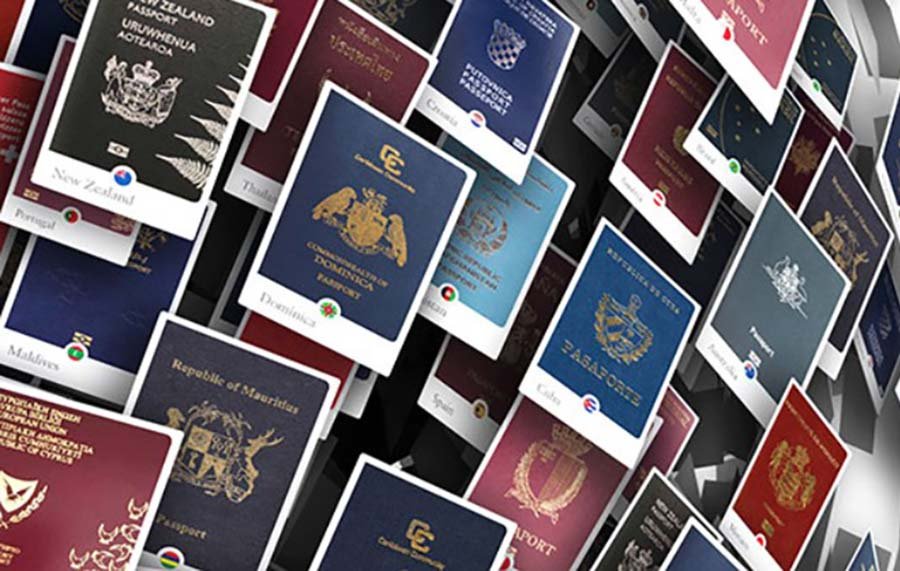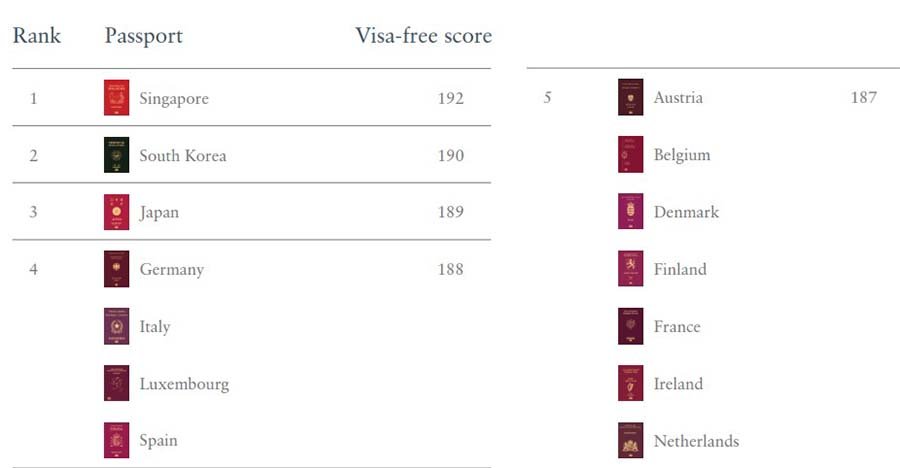read also
Ratings / Research / Reviews / Analytics / USA / United Kingdom / China / Denmark / Finland / France / Germany / Ireland / Italy / Spain / United Arab Emirates / Georgia 05.10.2025
Henley Passport Index: Asia Leads While the U.S. and the U.K. Lose Ground

In July, Henley & Partners updated the Henley Passport Index. Based on IATA data, it assesses 199 passports and 277 destinations. The latest ranking shows Asia consolidating its leadership in mobility, Europe maintaining strong positions, and the U.S. and the U.K. continuing to lose influence.
Singapore once again tops the list, with visa-free/visa-on-arrival access to 193 destinations. Japan and South Korea share second place with access to 190 countries. Europe remains strong: seven EU states—Denmark, Finland, France, Germany, Ireland, Italy, and Spain—are in third with 189 destinations. Fourth place is shared by Austria, Belgium, Luxembourg, the Netherlands, Norway, Portugal, and Sweden (188). Rounding out the leaders is New Zealand, which shares its position with Greece and Switzerland.
Targeted changes were recorded in Eastern Europe, the Caucasus, and Central Asia. Kazakhstan rose to 63rd with access to 79 countries—thanks to agreements with Morocco, Tanzania, and Montenegro. Georgia moved up one spot to 42nd, with 123 destinations including Tanzania and North Macedonia. Russia fell two places to 46th (114 countries) as Pakistan and Mauritania dropped off the list and no new agreements were added.
Ukraine ranks 29th (147), Armenia 71st (67), and Kyrgyzstan 73rd (63). Belarus held 62nd (81 destinations): the loss of Mauritania was offset by a visa-free regime with Colombia. Uzbekistan retained 74th (62 countries) and added China. Afghanistan remains at the bottom, with access to just 25 countries. The gap between leader and last place has reached a record 168 destinations.
Among the most notable shifts are the U.S. and the U.K., both continuing to slide. The British passport, which topped the ranking a decade ago, is now sixth with access to 186 countries. The U.S.—a leader in 2014—fell to tenth (182 destinations) and risks dropping out of the top ten for the first time. India posted the biggest jump, climbing eight places from 85th to 77th, even though its accessible destinations grew by only two to 59. Saudi Arabia strengthened its position, adding four destinations and reaching 54th.
Chris Kälin, the creator of the ranking concept, notes that the distribution of positions confirms the importance of strategic diplomacy for mobility. Countries that actively conclude agreements and expand reciprocal regimes climb the table, while passive players lose ground.
Special attention is given to the UAE and China. Over the last decade, the United Arab Emirates has moved from 42nd to 8th, the only country to break into the top ten. China improved by 34 places—from 94th in 2015 to 60th in 2025. Its openness score rose from 20 to 75 in five years: in 2025, all Gulf states, as well as Argentina, Brazil, Chile, Peru, and Uruguay, granted visa-free access to PRC citizens.
China’s visa liberalization is part of a strategy to attract tourists and investors, coinciding with growing air travel. According to IATA, global passenger demand in the first five months of the year rose 5.8%, with the Asia-Pacific region leading at 9.5%. In North America, international traffic grew 1.8%, but a 1% decline in domestic demand offset the gains. IATA Director General Willie Walsh noted that despite geopolitical risks, consumer confidence remains solid and the summer season shows steady booking growth.
A ten-year retrospective shows that only 16 passports declined. Venezuela lost the most—down 15 places (from 30th to 45th), followed by the U.S. (–8), Vanuatu (–6), the U.K. (–5), and Canada (–4). The shift reflects a broader trend: former mobility leaders are giving way to new regional players that actively deploy diplomatic tools.
Henley & Partners CEO Juerg Steffen emphasized that U.S. and U.K. citizens are now among the most active applicants for investment migration programs. A passport is no longer just a travel document; it has become a proxy for diplomatic clout and a strategic instrument of global security.
In the global Henley Passport Index 2025 report published in September, small adjustments were recorded for several countries. Singapore remains first, with access now to 192 destinations (down from 193 in July). South Korea ranks second with 190, Japan third with 189. Germany rose to fourth with 188 destinations, joined in the upper tier by Italy, Spain, and Luxembourg. The U.K. stayed in 8th place and the U.S. in 12th, confirming the gradual shift in global mobility centers.









